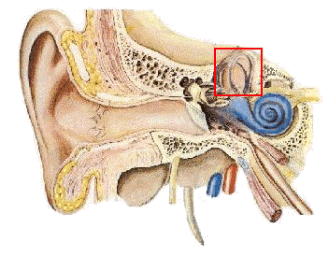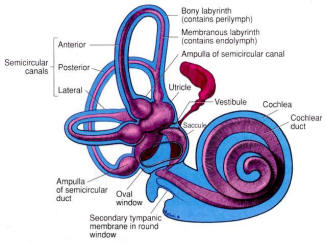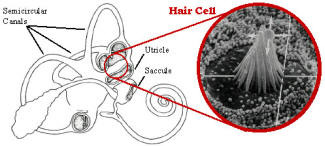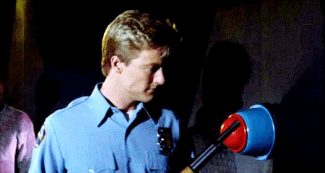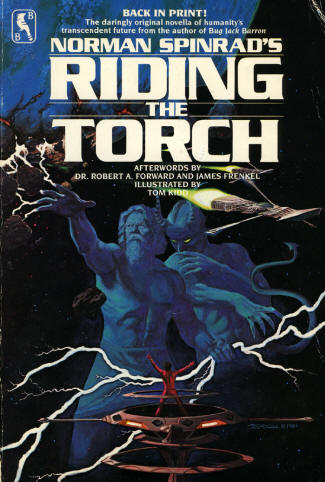"VEE HAVE VEYS OF MAKING YOU LOVE SENTIENT BEINGS" -- NAZI METHODS OF INDUCING "BODHICITTA"by Tara and Charles Carreon
November, 2003
"Afterward we watched a documentary of animals being tested in labs, kittens being injected with flea spray, monkeys struggling against restraints while medical researchers smashed their skulls with a giant cow puncher as a way to study head trauma. After that there was a movie about lambs being slaughtered."
-- "The Buddha From Brooklyn," by Martha Sherrill
If you wouldn't do it to your kid, why do it to yourself? Jetsunma was using these insanely violent images to induce Post Traumatic Stress Disorder ("PTSD"). According to the American Psychiatric Association, "psychological damage ... can result from experiencing, witnessing, or participating in an overwhelmingly traumatic event."
There are two types of horrible events that can cause PTSD when witnessed:
1. Seeing another person violently killed or injured;
2. Unexpectedly seeing a dead body or body parts.
Dr. Manaan Kar RayJetsunma used this Nazi mind control trick to isolate her prey from sources of support. As the APA says, one of the symptoms is "Avoidance [which causes] the person [to] avoid close emotional ties with family, colleagues, and friends."
The symptoms of avoidance may also create a stunned mental state, much-desired by spiritual seekers, who hate emotions and crave a peaceful mental state. The APA describes this symptom of avoidance resulting from witnessing trauma: "At first, the person feels numb, has diminished emotions, and can complete only routine, mechanical activities. Later, when reexperiencing the event, the individual may alternate between the flood of emotions caused by reexperiencing and the inability to feel or express emotions at all."
Dechen, whom Jetsunma immediately identified as afflicted with low self esteem, was predisposed to PTSD by identified risk factors:
"The psychological history of a person may include risk factors for developing PTSD after a traumatic event:
• Borderline personality and/or dependent personality disorders;
• Low self-esteem;
• Neuroticism;
• Pre-existing negative beliefs;
• Previous trauma.
"People with borderline personality disorder often have a history of physical and/or sexual abuse, neglect, hostile conflict, and parental loss or separation. Dependent personality disorder is characterized by low self-esteem, fear of separation, and the excessive need to be cared for by others. All of these features may predispose someone for PTSD after experiencing a traumatic event."
According to Dr. Ray, "People who have experienced previous trauma(s) are at risk for developing PTSD. Repeated exposure to trauma causes hyperactive release of stress hormones, which may be instrumental in creating symptoms of PTSD." Dechen was in a perfect condition for being thrown into acute PTSD after the automobile accident. Setting up the tribunal in the dark house, dressing in black leather, assaulting her victims in front of an audience of sycophants: it is a textbook case of brutalizing a vulnerable person into mental hell.
Dechen was forced to witness the brutalizing of her monk-boyfriend, and also to directly experience additional trauma. The types of directly experienced traumas that are known to cause PTSD are:
1. Combat;
2. Kidnapping;
3. Natural disasters (e.g., fire, tornado, earthquake);
4. Catastrophic accident (e.g., auto, airplane, mining);
5. Violent sexual assault;
6. Violent physical assault.
Dechen had just been in a car crash, in which she suffered severe concussions and cranial lacerations requiring stitches (number 4). She was effectively kidnapped and abandoned by her mush-brained mother, who obediently delivered her directly from the hospital into Jetsunma's clutches (number 2). Jetsunma shows up dressed in combat gear, black leather (evoking number 1). She then subjects Dechen to a violent physical assault (number 6). Hey, four out of six ain't bad.
After these traumatizing events, Dechen was subjected to social ostracism, forced to do only menial tasks like toilet cleaning and floor scrubbing, required to pray many rounds of penance (Vajrasattva), and otherwise kept in a traumatized state.
Of course, all the monks and nuns who participated in this horror show were also being given a booster shot of trauma for themselves. These repeat inoculations of trauma help maintain the submissive character that is so desirable in a devotee. Still capable of performing routine activities, they remain productive. Alienated from their families, they are unlikely to break away from the group. Stifled in their emotions, they are unlikely to develop distracting relationships that diminish their dedication to the guru. Well-developed devotees of course enjoy imbibing another dose of trauma, which is considered good discipline. The Christian flagellants, Hindu faqirs, and Tibetan ascetics raised the self-administration of trauma to the level of high art. But Jetsunma's muscled celibates did not intend to be outdone. Devotees of pain are like no others.
THE BUDDHA FROM BROOKLYN: THE GREAT BLESSING, by Martha Sherrill
copyright 2000 by Martha Sherrill
You have to see through the luster of all the things you play with. You have to take the inner posture of leaving the party. -- Jetsunma Ahkon Lhamo
Dechen borrowed her mother's white minivan the next morning and drove to the town house in Darnestown where the Monk was living with five other monks. She parked on the street and went inside. "I'm going to see Khenpo," she told the Monk, "and I think you should come, too."
On the drive together there were long periods of silence. When directly confronted on the phone, Dechen had told Alana about the affair. And when Dechen insisted that she had not "broken her vows"--meaning her root vows--Alana had accused her of obnoxious hairsplitting. "You were together alone on a bed in a hotel, and you say you didn't break your vows?" There were several rounds of this until Alana simply said, "I can't talk to you anymore," and hung up. Dechen then called the Monk and told him what happened.
"You told Alana?" he said, in horror.
But later that night Alana called again to say that a meeting with Khenpo Tsewang Gyatso had been scheduled for noon the following day and that Jetsunma would see her in the evening. Nobody had suggested that Dechen bring the Monk along. That was her idea.
The drive to the temple seemed very long, and dreadful. Now she saw that it was a mistake not to have confessed. This was the worst possible outcome -- to be found out by Alana and dragged before Khenpo, the venerable Tibetan scholar. She had memories of India, of having gone before the very same man once before with news like this. The irony staggered her.
Dechen and the Monk walked inside the temple together and found Khenpo upstairs, in a suite of rooms he always used when visiting. He ushered them inside and sat down on a purple sofa in his bedroom. Khenpo was a short man with a small mustache and a perfectly round head. He was younger than most Tibetan scholars -- still in his fifties -- and while he seemed easygoing and simple, he was also known for having one of the best minds in the Nyingma school. There didn't seem to be an esoteric point that he couldn't elucidate or a question he didn't have an answer for. More than anyone, the Monk had been awestruck by Khenpo's intellect and wisdom, by his subtlety and clarity. The Monk had hoped to stay by Khenpo's side and keep working on translations with the scholar. As a teacher he was revered in both the United States and India, where he ran the monastery in Bylakuppe and the large university as well. For the last couple of years he'd been coming with greater frequency to Poolesville to give teachings and instruction. For a while now the Monk had suspected that Khenpo's trips to KPC were designed to keep Penor Rinpoche informed of the students' progress there, and--in light of some of the New Age overtones to Jetsunma's teachings--make sure that her students were also offered something more traditional.
Dechen sat at Khenpo's feet. The Monk sat farther behind, in a display of great humility and modesty. Khenpo seemed to want no further details--he'd already heard enough from either Jetsunma or Alana--and launched immediately into an angry diatribe. His face looked pained.
"How could you do this?" he said to the Monk. "You've been a monk for twelve years! . . . You may have some realization, but without moral discipline you have nothing."
"And you!" he said to Dechen. "You knew! You knew you needed to confess!" She looked back at the Monk. He said nothing.
Khenpo explained that it was true: their root vows had not been broken. They had broken a branch vow, which would now remain forever broken. But he was clearly appalled. "The hiding! The secrecy!" If they had come forward and confessed, the negative karma could have been purified. But because they didn't come forward and were found out after a confrontation, the vow would forever be broken, and forever unpurified.
Dechen listened very hard for instructions and advice from Khenpo during the twenty-minute meeting. "Do Vajrasattva practices," he finally said, but he didn't suggest an amount. They could try to purify the karma, but, basically, "Nothing can be done at this point."
Driving home, Dechen said, "I won't say I told you so."
"Good, " said the Monk. They said nothing else.
Dechen didn't mention the meeting she had scheduled that evening with Jetsunma. She assumed it would be one on one, and assumed she'd be reamed out. The Monk came from another school of Tibetan Buddhism, and it wasn't really Jetsunma's place to reprimand him. He had already pondered this himself. Technically, Khenpo was the only person in Poolesville--besides perhaps Alana-who should ever know what had happened between the Monk and Dechen. When vows were broken it was a private matter. If it became public it would be an insult to Khenpo, suggesting that his advice alone wasn't enough--and showing a lack of respect for his ability to handle the situation properly.
Still, the Monk had a bad feeling about this vow breakage. He had a feeling it wasn't going to remain a private matter. Jetsunma didn't seem to care about doing things in a traditional way. And Poolesville wasn't like the other Dharma centers; it didn't feel like the other Dharma centers. It was the kind of place where anything could happen.
***
After she dropped the Monk at the town house, Dechen began the drive back to her mother's. She felt small behind the wheel of the lumbering minivan, and the burgundy robes felt heavy on her skin, a demanding weight that engulfed her small body. She drove on Quince Orchard Road and began thinking about whether she should remain in Poolesville. But she worried. If she couldn't make it as a nun at Kunzang Palyul Choling, the largest concentration of Tibetan Buddhist nuns in America, where could she?
The sky was dark, the color of fresh wet concrete. It was about two o'clock on the afternoon of February 9, 1996. She made the left-hand turn onto Longdraft Road and never noticed the small beige car in the oncoming lane. It was going fifty miles per hour. When the two vehicles collided, the minivan was totaled. So was the other car -- its front end was flattened up to the windshield.
Dechen was dizzy when she squeezed out of the minivan, and she brushed the broken glass off her robes. She stepped over to the small beige car. "Are you okay? Are you okay?" she asked. The driver was a middle-aged blond woman in a business suit. She looked dazed. "I can't really feel my leg," the driver said. Dechen stood next to the car and worried--until other cars began to stop and their drivers told Dechen to get back into the minivan. Her face was covered in blood. When the paramedics came, they put her in a neck brace and carried her to the ambulance, where the driver of the other car was already stretched out. Together they were taken to Shady Grove Hospital in Gaithersburg. The driver of the car had a sprained leg and a bruise on her shoulder. Dechen had lacerations of the face and head from the broken windshield glass--she had forgotten to wear a seat belt--and after receiving fourteen stitches and being given Vicodin for pain, she was told that she was still in shock and needed to rest.
Sherab and Dawa arrived at the hospital--they'd driven by Quince Orchard Road and recognized the crushed white minivan as Ayla Meurer's. At first the two nuns assumed that Ayla had been in an accident, but once they realized that it was Dechen who'd been driving -- and that she was going to be okay -- both nuns turned critical. "How could you get in a car accident?" they asked her. It was more evidence of the negative karma that Dechen had been accumulating lately. They immediately called Alana from Dawa's cell phone. Dawa spoke with Alana for a moment, then handed the phone to Dechen.
Alana's voice was cold and stern. "Don't think that this means you can get out of tonight's meeting," she said quickly. "Jetsunma says you aren't hurt that badly."
By the time Ayla arrived at the hospital, her daughter was being released. As they drove, Dechen felt her shame and despair drifting into numbness. Scattered around her face and short, dark hair were shaved marks and cuts, and the thread of the stitches. " I already heard that you're fine," Ayla said, "so I can say that I'm really mad at you. How could you break your vows?"
Ayla handed Dechen a folded bundle of yellow robes -- the robes the ordained wore for ceremonial and special occasions. She'd been called by Alana and instructed to get her daughter out of the hospital, give her the yellow robes, and take her directly to Ani Estates. There was going to be a meeting. In the car with her mother, Dechen stared straight ahead at the road. A meeting. She felt nothing. She never got hysterical when unexpected things happened like this. Her reaction was always delayed. And, anyway, the last thing she was going to do was cry.
"You know," Ayla said as she dropped Dechen off, "you're in serious trouble."
It was about four-thirty when Dechen arrived at Ani Estates, the large, beige stucco-and-wood tract house on Spates Hill Road where five nuns--Dawa, Dara, Aileen, Alana, and Dorje--lived. Dechen walked into the house alone and saw that activity had already begun. Several nuns were in the kitchen washing large offering bowls. Atara was standing in the middle of the living room, repeating Jetsunma's instructions. "Jetsunma says there should be chairs lined up in here, like this," she was saying. "And Jetsunma says there should be an offering out for the ordained" -- so pretzels and chips and other refreshments were to be set out. The table in the dining room was to be removed, "and under here," where the dining room table was, "Jetsunma says there should be two chairs."
Dechen had been inside the house many times, for all kinds of reasons. She'd come frequently to borrow movies there from Aileen's video library. She'd exercised on the Health Rider. She'd helped with some Tibetan translations there. She'd even lived there for a week once, when she had no other place to live--and she had cleaned the house to make money. When Jetsunma and Sangye got together, their Consort Engagement Party had been there. And over the summer Dechen had attended the meeting of the ordained at Ani Estates where everyone was asked to sign a paper relieving the temple of any responsibility for taking care of them. But never had Dechen--one of the mousiest of the nuns -- been the center of any attention like this. She sat on the floor in the corner and watched the preparations. She watched Atara stage- direct and everybody follow her orders. She noticed that the vertical blinds were drawn.
The house grew darker as night fell. As the monks and nuns began to trickle in, it was clear most of them had very little idea of why they had been called to Ani Estates. The meeting was mandatory for all ordained. Only Sangye Dorje--later admitting that he had a sense of what might transpire--quickly volunteered to take the prayer shift and remain at the temple. As the rest of the nuns and monks arrived, they saw a table of food and began picking at the snacks. Dechen had moved to a spot on the carpeted stairs that overlooked the room and tried to keep her head down. She was feeling a bit woozy. She kept touching the stitches on the top of her head, and it was weird that they didn't hurt. One cut on the left side of her face kept tickling her. She overheard whispers among the monks--they were always the most clueless. "What's going on? Do you know?"
The Monk was among the last to arrive. He came with Konchog and was told to sit away from Dechen until the meeting began and not to speak with her. He sat on the floor in the front hallway and furtively looked up to the stairs, trying to catch Dechen's eye. She only looked away.
Then Atara led them to the dining room and told them to sit on the chairs under the lights. Dechen found herself looking around the room, and at the monks and nuns in the chairs lined up facing her. One by one she looked at their faces. She had known many of them a decade, since she was seventeen. She had sat beside them, prayed beside them, learned to prostrate beside them, been ordained beside them. It felt like they'd been through the wars together. They'd followed the voice of Jeremiah, made the move to Poolesville, enthroned their lama, watched Michael's leaving, built the stupa garden, and seen Jetsunma marry Karl. They'd done all-night prayer rounders together, floated through the exquisitely beautiful White Tara retreat and the amazing Rinchen Ter Dzod, and sat together through last summer's Nam Chu empowerments. They'd kept a twenty-four-hour prayer vigil going, without a break, since it started in the dark basement of the little brick house in Kensington ten years before.
Here was the largest collection of Tibetan Buddhist monks and nuns in America. They were kind people, good people. Dechen admired so many of them, for wanting to dedicate their lives to something good, for building such a beautiful Dharma center. For trying to live by their ideals.
A broken vow wasn't a small matter. The results would be profound and long-lasting. The bad karma would spill inevitably into the path of everyone in Poolesville and create obstacles. It would cause ripples that would produce more suffering. Dechen and the Monk had not just betrayed themselves and their own Buddha nature but defied the guru and hurt the entire sangha. Why hadn't Dechen been able to see that all along? Why hadn't she come forward months ago?
Most of the lights in the house were dimmed. And the lights in the living room were shut off. Only the lights over Dechen and the Monk were kept brightly lit. Alana was wearing burgundy robes and stood in the dining room before her fellow ordained.
"There has been a vow breakage," she said.
The room became utterly quiet. "Nobody is ever to speak of what happens here tonight. And remember, everything you see is compassionate activity." Alana looked squarely at the Monk. "You are not to speak--either of you--or defend yourselves in any way."
Some headlights flashed behind the windowpane in the front door. Dechen saw that Jetsunma had arrived. The front door flew open, and the room of ordained rose to their feet. Jetsunma quickly pulled off her black overcoat in the foyer and tossed it to Atara. Underneath she was dressed entirely in black, too-black wool and black leather.
"You fool!" she shouted at the Monk, as she ran toward him, then struck him hard on the head with her open hand. The Monk lost his footing and staggered momentarily. When his balance was regained, he realized that his wire-rimmed glasses had been knocked to the floor and he couldn't see.
Jetsunma studied him briefly. With his glasses off the Monk looked like a mole-soft and blind. "Sit down!" she yelled. The Monk and Dechen began to drop onto the seats of their chairs, and Jetsunma yelled again. "No! Sit on the floor! You don't deserve to sit on the same level as these other ordained!"
Dechen sat on her knees. The Monk sat cross-legged on the ground, with the large lights swinging overhead. "I brought you into our hearts!" Jetsunma yelled at him, then bent down to punch the Monk again hard on the side of the face. "We took you into our homes! And this is how you repay our kindness? I should throw you through that sliding glass door but you don't have the merit."
The ordained were quiet, barely moving in their chairs. Dechen looked out into the living room; in the shadows she could see the outlines of a few nuns who were holding their stomachs. One monk had his hand over his mouth.
"This is a stain on all of us--and has harmed all ordained forever." Jetsunma yelled, continuing to punctuate her comments with blows to the Monk's head. "This has shortened my life, the lives of our sangha, and made it harder for all future ordained to keep their vows. And it's shortened their lives as well. They worked so hard to keep their vows purely, and now you've made it so hard!"
Dechen looked up again and heard Tashi sobbing.
Jetsunma turned to face the little nun. Dechen stared up at her. "And you!" she yelled. She struck Dechen across the side of her head with the heel of her hand, not far from a few stitches. "I've taken you into my heart! I've done everything I could for you!" She slapped her again on the forehead." There are words for women like you, but I won't use them!" she yelled. "It disgusts me to see you in those robes. It disgusts me to see your face!"
Dechen looked up into Jetsunma's face and never broke her gaze. Jetsunma had a look that Dechen never remembered seeing before. She was almost. . . smiling. But it wasn't a smirk as much as a leer. "What you said happened to you in India before, what you told me," Jetsunma shouted, "that isn't what really happened, is it? You lied to me." She backhanded Dechen again.
Jetsunma began listing instructions for Dechen to follow. The young nun felt herself focusing on all of Jetsunma 's words, all her advice and instructions, hoping to remember every moment. Dechen was never to look at or speak to the Monk again. She was to put her yellow robes on her altar and prostrate to them every day. She needed to get a job and payoff all of her debts. She had to stop "leaning on" the other ordained. She needed to do one hundred thousand Vajrasattva practices, but Jetsunma wasn't sure that was enough. As a punishment, she and the Monk were going to clean the temple every day--the bathrooms, the floors, the kitchen. And every moment that Dechen wasn't either cleaning or working to pay off her debts, she was to be practicing. As for reading or TV or any other "enjoyments," there were to be no more than four hours per week. She talked about how little remorse Dechen had. "You have never done a single thing that I have ever told you to do," Jetsunma yelled angrily, "so I have no confidence that you'll do it now."
Dechen followed her lama's eyes. She soaked up her lama's words. These were blessings, she told herself. Each word was a great blessing. Each slap and slug, a great, great blessing. Dechen tried to be as submissive as she could be and tried to find a posture of accepting all the blessings as they came her way. This wrathful display--as it was called--would only help to purify any negative karma that had been created by her contact with the Monk.
The Monk had been very still, but he turned slightly to see if Dechen was okay. She was cowering. She was humiliating herself: He wanted to yell at her, "Get up! Get up!"
Jetsunma turned to him again. "You may keep your robes but not wear them," she said, "and if you were in better health, I'd make you clean every toilet at the temple eighteen times a day with a toothbrush." She pointed to the crowd in the chairs. "Their toilets!"
Dechen was to clean toilets, too, she said. "I can't tell you not to come to teachings, but if you do, sit behind an umbrella or something. I don't want to see your face. . . . And I've talked to Khenpo Tsewang Gyatso about this--you may not keep your robes!"
At this Jetsunma walked out. The room remained perfectly still. Alana returned to center stage. She announced that Jetsunma wanted the ordained to tell Dechen and the Monk how this evening had made them feel--sharing their anger and outrage would help Dechen and the Monk "with their remorse."
Ani Rene spoke first and addressed her comments to the Monk, with whom she had studied. "Driving in the car with you one time," she said, "you criticized some lamas and poisoned my mind with gossip!" she said, shaking with rage. "I felt sick for an hour, and I could have just ripped you apart. " Tashi was so overcome with emotion that he could barely get the words out. He was horrified by what had happened, particularly by the fact that Jetsunma's life would now be shortened. Then came Konchog, the young monk who did press relations for the temple and who was a scholar. He also addressed his remarks to his friend, his housemate, his fellow monk. "I had so much faith in you, " he said, fighting back tears. "You kept your vows for so long. And you talked about how the Dharma texts were more important than Jetsunma, and you almost turned my mind away from my teacher."
The nuns of Ani Farms each spoke to Dechen. Palchen said that Dechen needed to face her total irresponsibility and lack of thought for anyone but herself. Alexandra mentioned Dechen's thoughtlessness. She had never contemplated how her breakages would affect anybody but herself. Sherab was the angriest. "You're always rebellious, and everything has to be Dechen's way!" she yelled. Another nun talked about how she'd helped Dechen out when she broke her vows last time, how supportive she'd felt. This was different. "Countless sentient beings," she said, "will be hurt because of this."
But most of the comments were directed at the Monk, and they continued for forty-five minutes after Jetsunma's departure. In the following ten days there were two more meetings--where Dechen and the Monk were required to confess the details of their affair to the entire ordained sangha. At one point, as Dechen tried to give an account of exactly what had transpired between them sexually, the Monk began shouting; "Shut up! Shut up! It's none of their fucking business!" And it was this attitude, his indignation and pride, which seemed to fuel the anger of his peers. One by one in all three meetings, the ordained told the Monk how they really felt about him, how egotistical he was, how deluded, how he lorded his knowledge of Tibetan and all his studies and retreats and expertise in Tibetan Buddhism over everybody and made them feel bad, how he'd tried, with all his talk of tradition and other teachers and other Dharma centers, to turn them against their lama. He had taken many empowerments, but he'd somehow missed the boat.
The Monk didn't know these people well--he had been in Poolesville only eight months--and it shocked him that they would have such intense hatred for him. It also surprised him that Jetsunma should feel so strongly--to scream at him, and slug him, to threaten to throw him through the sliding glass door. He had refused to give her instruction in some high teachings, and he'd ignored what he felt had been her romantic advances: was that the explanation for her rage? But what had he done to the rest of these people to make them so angry? The attacks on his character were personal, and brutal. This is like something out of the Spanish Inquisition, he was thinking. He knew what Jetsunma would say, of course, that to strike a student was to give him a great blessing. There was a long tradition of teachers hitting students in Tibetan Buddhism. He had heard that in Tibet students were sometimes beaten unconscious with logs and clubs. Penor Rinpoche himself, the legend went, had cured one of his students of cancer by beating him to a bloody pulp--then collapsed outside on the grass and sobbed. But hitting a student in this country, wasn't that a great risk? Was this monastery life in Tibetan Buddhist America?
***
In the following weeks Dechen went overboard to live by Jetsunma's edicts and purify herself. She spent two or three hours a day cleaning the bathrooms or floors or whatever Rinchen told her to do. She did her Vajrasattva. She went to the bank, consolidated her debt. With credit cards, back-tithing. and what she owed Palchen in rent, the total came to four thousand dollars. She found a job right away, as a secretary in a publishing house. And since Jetsunma didn't want to see Dechen's face, she listened to her lama's teachings on Wednesday nights while scrubbing the solarium floor. She was largely shunned by the sangha but felt soothed by her mother.
They stayed up late at night, talking about how Dechen had come to veer off her intended path, how she felt dried up spiritually--and did not trust the words of her lama. Ayla Meurer spent hours with her daughter after the night at Ani Estates. going over every detail of the evening, and every word Jetsunma had spoken. Ayla admitted that she'd had difficult times at KPC over the years, too. Michael Burroughs had said and done many things to hurt her. She'd sometimes felt rejected and ignored by the inner circle. But to her Jetsunma was like Jesus Christ, a miraculous savior of the entire planet. And over the years she had felt great blessings flow from Jetsunma and she'd been able to find her own path, her own way of studying Tibetan Buddhism. She encouraged Dechen to find her way, too.
Dechen spoke a great deal with Ani Catharine Anastasia, her assigned mentor in the ordained community. Catharine Anastasia helped her see that the Monk was not her friend and had never truly cared about her; he'd only planted poison in her mind. He'd come into her life and turned her against the guru, turned her against Poolesville. In a moment of guilt and renunciate fervor, Dechen threw out all the robes that she wore while she had been with him, and she returned all the Tibetan texts and manuscripts he had given her.
The loss of her robes was too much even to consider. If Dechen wasn't an ani anymore, who was she? As Jetsunma instructed, she put the folded robes on her altar and prostrated to them not just three times a day, as Jetsunma had instructed, but nine. She continued to keep her vows assiduously, even after Alana made a point of reminding her several times that she was no longer a nun, and Sherab left an angry voice mail for her when she wore burgundy jeans and a burgundy T-shirt to clean the temple. "How dare you wear burgundy!" Sherab said. "You aren't a nun anymore. " But Dechen was determined to earn her robes back, and Ayla encouraged her. She told her daughter that anything was possible, if she paid back her debts, lived responsibly, practiced Vajrasattva, and kept practicing and practicing. In every spare moment of the day, Dechen did. "I was very remorseful and sad," she said later, "but I was trying to get myself together."
When Chris Finney called her one day in late February, Dechen was surprised to hear her cheerful voice. It seemed like a long time since anybody from the temple had called her--and sounded friendly. Chris had a small business making prayer beads that were sold in the temple gift shop, and she was calling to offer Dechen her supplies. She could make some decent money stringing the malas, and Chris said she knew that Dechen probably needed it.
"You're not making malas anymore?" Dechen asked.
"I'm not coming to Poolesville anymore," said Chris.
"You aren't?' Dechen asked. This seemed unimaginable. Chris was one of the founding members--one of the First Wavers.
"No, " Chris said, and then she mentioned something about seeing a lama in Frederick, Maryland, now. "We're just going on with our life in another direction."
Dechen didn't inquire further and, frankly, didn't want to know any more. The repercussions of Chris's departure were too horrible to think about. Dechen would rather break her vows a hundred more times than break samaya.
Chris didn't offer any explanations, either. She just made plans to give Dechen all her beads and wire and wire cutters. The truth was, through the Dharma grapevine she had heard about the night at Ani Estates and was wondering how Dechen was holding up. News can travel fast in a temple when something unusual happens. But when Chris asked Dechen how she was doing, she said, "Great! I'm doing great."
And that was truly how Dechen felt. Her mother was being kind and helpful. Dechen was paying off her debts. She liked her new job at the publishing house. Her boss, a woman, was supportive. "You don't know what you're worth, do you?" she said. And Dechen was already looking at the classified ads--to see if she could afford a studio apartment in Gaithersburg.
A few nights later Dechen was dusting the Guru Rinpoche altar in the prayer room when the sangha gathered in the Dharma room for a teaching from Jetsunma. Dechen had moved into the solarium to begin cleaning tables when she heard Jetsunma's voice. "If you could sample Your teacher's mindstream," she said, "if you could sample the nectar of what your teacher actually has to give you . . . it is contained within this teaching."
Dechen could hear Jetsunma 's voice almost too clearly, coming from a loudspeaker in the kitchen. "I hope that all my students who intend to remain my students are here tonight," she said, "and those who are not here, I'm afraid I'm sorry to say that it may be due to causes having been created that make it not possible or not easy for you to receive what comes directly from the mind and the intention of your teacher."
She began to read a poem she'd written to the sangha, which she explained had been inspired by the activities of two of her students. It was called "War Cry:"
Bitch,
I have seen you.
I have heard your voice.
I have smelt your smell.
I have lived
And died with you.
I know your name. . .
Samsara.
Bitch, whore,
Whatever garment you wear
I will know you.
Your smile is no seduction
To me.
I know you.
You will appear
In lovely forms,
Seductive, caressing, singing songs
Filled with promises.
It is then I will appear
Far more beautiful than you
Adorned with garments
Of pure aspiration
Resplendent with gold and gems
Of pure bliss.
From my mouth will come
The ambrosia of Dharma
And from your
Grasping arms
I will steal my children away,
Like a thief
In the night. . .
And lead them to
Paradise.
Dechen felt herself sinking to the floor. She put her hands over her face. She felt her breath stop. More than the night at Ani Estates, more than anything, this poem hurt her, like a knife in her stomach.
Be warned,
Whore-mother of suffering,
I am coming.
I am relentless!
Not one of my children
Will I abandon to you.
I will meet you on
Every hill and mountain.
In every ocean, in every country.
In the sky, in the six realms,
In form and formless lands,
No hell or heaven will
Hide you from me.
I will never stop.
Like a tigress
I will come,
Mouth dripping with blood,
Claws extended.
I will come and slay you,
I will rip you apart
Cut up, shredded,
Sliced and diced,
No one will know
Which part to call Samsara.
I will finish you.
You will not enslave my children.
Then I will shed tears
To heal you.
I will scoop you up
In my arms,
Tenderly I will hold
Your head.
My eyes will shine
Wisdom and compassion upon you.
My body will be your home.
My speech will sing lullabies
Of pure virtue.
Then you will remember
You are my child too.
Samsara.
Yes, you too.
Then, beloved child
Who is never separate from me,
We will depart together.
We will be in Paradise.
Jetsunma began explaining the poem, line by line. Of course, it wasn't literally about two students, it was about the entire sangha, and it was about samsara. "Whore indicates an awareness that samsara is completely unwholesome," she said. "Samsara is just simply filled with degradation and unwholesomeness, with shit and garbage. There is nothing here but garbage, and so whore is a word that indicates the complete unwholesomeness of it."
She kept reading.
From my mouth will come
The ambrosia of Dharma
And from your
Grasping arms
I will steal my children away;
Like a thief
In the night
"Skillful means are indicated here," Jetsunma said. "The bodhisattva will come like a thief in the night. And I'll tell you that there have been many times that I have stretched the truth, quite a bit, in order to hook sentient beings, that I have elaborated in order to hook sentient beings, that I have put on my chicken suit and danced in order to hook sentient beings, and I know that if I have done that, my humble self, then I know that the great bodhisattvas have done it much more. Whatever means are necessary! . . . When bodhisattvas meet with their students, whatever skillful means are necessary are legal!"
Dechen stayed on the floor, unable to get up. She felt a bit light- headed and confused. How long would this punishment go on? "There are many, many stories of great bodhisattvas who did not even follow the norms and traditions of the society in which they were born," Jetsunma said, "or the society in which they practiced. They threw all that out the window. And they did so because skillful means were necessary to overcome such a terrible demoness as this whore samsara."
Dechen slipped into a back room of the temple until the teaching was over and then found a ride home with Bob Colacurcio. She mentioned nothing to him about the poem. A few days later she got up the courage to talk to Catharine Anastasia about "War Cry."
"That poem--was it about me?" she asked over the phone.
"I was sure you were going to think that--you're so self-centered," Catharine Anastasia said. "It's not about you. It's about Wib and Jane."


